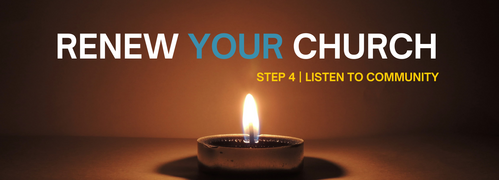

Listen to Your Community
As part of your strategic planning process, it's essential to listen well—not only to God and to one another—but also to the people in our surrounding community. Understanding the hopes, challenges, and needs of our neighbors will help us discern where God is already at work and how we might faithfully join in. Listening to our community is more than a one-time project—it’s a posture of humility, curiosity, and care. It enables us to build meaningful relationships, deepen our local impact, and shape a ministry vision that reflects both the gospel and the real lives of those around us.
Sources of Wisdom
Make a list of at least a dozen community leaders that you could interview in person, by Zoom, or by phone. Some frequently interview community leaders include:
- Country Officials
- Business Leaders
- Community organizers
- Faith-based leaders
- Rotary Club leaders
- Non-profit leaders
- Mayor
- City Manager
- Principals/Superintendent
- School Social Workers
- Hospital Administrators
- Fire/Police Chiefs

Essential Tasks
- Have your team list what you hope to learn from the listening activities you engage in
- Then make a list of people you feel have a "pulse" of what's going on in the community
- Assign a point person who will coordinate the community interviews
- Assign interviewers to community leaders
- Provide interviewers with email template
- Confirm where responses need to be uploaded or emailed to

Questions to Ask
Make a List of at least 12 questions to ask community leaders. Then rank the list of questions in order of what you feel is most important, keeping your "top 8" you intend to ask. Before interviewing leaders, decide how you will compile the data, where it will be stored for future use, who will be conducting the interviews.
Sample Questions
Sample Questions
- What positive changes do you see occurring in our community, and how might faith communities support and build upon these “bright spots?”
- In what ways do you anticipate that our community will be different 5 years from now?
- What challenges, needs, and opportunities will arise due to these changes?
- What are your hopes for our local community?
- What do people in this community need most from faith communities like ours?
- How could you envision our church being a transforming presence in this community?
- Are there individuals or groups that would appreciate being welcomed or befriended by our church?
- Who (individuals/organizations) is doing transformational work right now? How might we partner with them?
Additional Suggestions
- Can you tell me about your role and how you engage with the community?
- What’s your sense of how our community has changed in recent years?
- What are the top three trends or shifts you’re noticing right now?
- What populations in our area seem most underserved or at risk?
- What are the biggest challenges families or individuals in our area are facing?
- Are there any new or growing needs that have emerged since the pandemic or economic shifts?
- What’s going well in our community that people may not always notice?
- Are there local initiatives or organizations doing especially impactful work?
- Where do you see untapped opportunities for collaboration, service, or community-building?
- What role do you think churches or faith communities currently play in our city/town?
- What would you love to see churches doing more of—or differently—in the community?
- What barriers, if any, do you see between faith communities and the broader public?
- What changes do you think are coming in the next 3–5 years?
- If you could wave a magic wand and fix one thing in our community, what would it be?
- What advice would you give a church seeking to serve well and be a good neighbor here?
Email Invitation Tips
- Send email that includes the who you are and explains the purpose of the interview
- List the date you're hoping to completed the interview by (in preparation for the vision retreat)
- Ask to meet with them for 20-30 minutes in person, by Zoom, or by phone
- Suggest a few meeting times or include a scheduling link.
- Include the list of questions you'll be asking
- Thank them in advance for responding quickly
- Include your contact info
Interviewing Tips
Share the purpose for the interview - to learn how the community is changing, identify local needs and opportunities, and understand how your church might partner, serve, or respond. Ask tailored questions based on the leader’s role. When starting the interview:
- Begin with brief introductions. Thank for taking the time to meet with you.
- Ask the questions on the list. Invite to share more if appropriate, or ask a related question if you feel their response would be helpful.
- Be mindful of your time. If you're running over time, skip a question or two, or ask if they have a few extra minutes.
- Ask community leader for suggestions about whom else you might interview.
- Close with thanking them the for their time and ask if they'd like a summary of the community leader report upon its completion.
- Send a handwritten thank you note within a few days of the interview.
Host Community Listening Sessions
Invite residents, business owners, school leaders, and others to share their experiences, concerns, and dreams in a facilitated, welcoming space.
Conduct One-on-One Interviews
Engage in conversations with key stakeholders in the community—such as local government officials, nonprofit leaders, teachers, and long-time residents.
Participate in Local Events
Attend festivals, town halls, school board meetings, and other civic gatherings to be present, observe, and engage with people in their natural contexts.
Study Local Data and Demographics
Use publicly available data (from local government, census, school districts, etc.) to better understand population trends, economic conditions, and emerging needs.
Listen to/Read Local News
Tune into neighborhood Facebook groups, local news outlets, or community newsletters to hear what’s being discussed and prioritized.
Walk or Drive the Neighborhood
Take prayer walks or observation drives to notice patterns, signs of life, places of struggle, and opportunities for ministry.